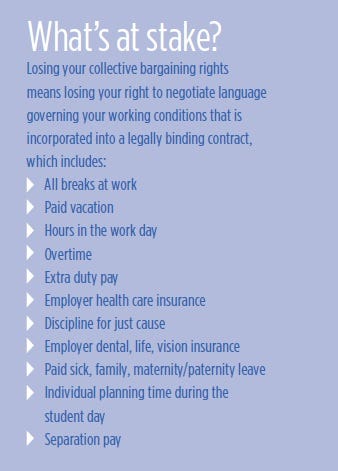Bargaining Your Contract — Your Right and Duty
Bargaining is a democratic process, and one in which every union member has a say. That’s worth protecting.
In Maryland, education employees work under their negotiated contracts, which are written jointly by their union and board of education. At the bargaining table, teams from each side discuss and debate employee and employer issues and concerns that affect both sides. The outcome of the negotiations become the conditions that make up your daily work life. Your legally binding — and collectively bargained — contract protects your pay, your working conditions, and your benefits.
But every year unions and collective bargaining come under attack by various groups trying to pass bills with appealing names like the Right to Work Act, Workplace Fairness Act, Employer/Employee Fairness Act, or the Dues Reduction Act. They have in common a goal of destroying the public’s and members’ faith in unions as the only reliable protectors of workers’ rights and fair labor practices.

We know what happened in Wisconsin when Governor Scott Walker stripped collective bargaining rights from teachers — educators can’t negotiate salary and teacher pay has dropped by 11% in some districts while contributions to health care and pensions have risen, making total compensation less than it was seven years ago. More and more teachers, many with master’s degrees and higher, are forced to take second jobs. Instead of a legally binding contract, a handbook created with no input from employees is imposed at the will of employers.
Here in Maryland, a strong collective bargaining law mandates negotiations between educators and the school board, a process — protected at every turn by MSEA — that determines your salary, wages, hours, and working conditions. The law also determines three subjects of bargaining:
Mandatory subjects are those that the school board and local association must bargain if a proposal is made by either party. Examples of mandatory subjects are salary, wages, benefits, and working conditions — including leave, work hours, work year, tuition reimbursement, and planning time.
Permissive subjects are those that the teams may agree to bargain over but are not required to. One team may also refuse to discuss a permissive subject. Examples of permissive subjects are the evaluation system and if bargaining sessions are to be open or closed to employees and/or the public.
Illegal subjects are issues that can’t be bargained because of state law. Examples of illegal subjects are school calendar and class size.
Who decides what subjects are brought to the bargaining table for debate and discussion? Through bargaining surveys, school and association-wide meetings, and individual conversations, your negotiations team collects information about the changes and improvements members want. As the team studies the issues to determine viability and legality, it may ask for guidance, support, and recommendations from MSEA’s legal team.
Bargaining is a democratic process — one in which every union member has a say. That’s worth protecting.mseanewsfeed.com
When the teams finally strike a deal — a tentative agreement — members step in to ratify the contract or send the team back to the negotiating table to keep working. Once ratified however, it’s up to every member and the association to make sure the contract is enforced — and to provide and gather feedback. It is through this collective bargaining process that educators have a voice in their work life.

